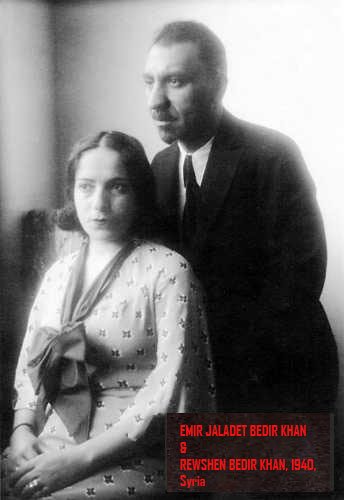‘the world is a flower, smell it and pass it to your friend’ - RewSen Bedirxan
“She was very strict on the three of us,” recalled Sînemxan Bedirxan of her late mother Rewşen Bedirxan. Digging into the earliest memories with her mother, Sînemxan walked The Jiyan Archives team through Rewşen’s legacy archive in an exclusive interview conducted in the city of Erbil.
Rewşen took her very first breath in Turkey on July 11, 1909. Having lost her father at the age of 6, her family were exiled from her birthplace due to their pro-Kurdish political activities, and they left Turkey for Jordan. Shortly after, they relocated to Damascus, Syria, where Rewşen was able to finish her education and became an Arabic teacher. Rewşen excelled in her teaching role and was later promoted to the headmaster of the school.
“She wanted us to be on our best behavior…she didn’t give us the chance to laugh around and was very strict and firm,” said Sînemxan of her head-strong mother, who prioritized the family’s image immensely.
In 1930’s, Rewşen had two children from her first marriage, one of whom tragically died at a young age and Husema Xan. According to Sînemxan, her mother’s first marriage would continue for three to four years until her mother had bravely decided she could no longer put up with the abuse she endured; no longer paying attention to other people's opinions who deemed separation as a ‘taboo’, Rewşen sought a divorce.
It was in 1935 when Rewşen married once again to Celadet Bedirxan, a noble Kurdish diplomat, writer, and political activist. Together they had two children, Sînemxan and a son named Cemşîd. When the siblings were in their early teens, their father passed away in 1951. His sudden death put a heavy load on Rewşen, who had to fill in the role of a mother and a father for her children. She faced lots of financial struggles but was a very proud woman and it all went unnoticed by her surroundings. She worked hard to provide for her children and always managed to put warm meals on the table.
Teaching was not Rewşen’s only occupation. Her late husband, Celadet, played a crucial role in shaping and expanding her political career alongside her father, Salih Bedirxan. Being the daughter of a high political figure meant she was born into a political household and brought up as such, which made it easy for her to follow in her father’s footsteps. By 1944, she became a founding member of the Patriotic Union of Kurdistan (PUK) being the party’s Women Representative in Haji Omran, South Kurdistan.
Succeeding in her career was costly for Rewşen, who faced lots of racial abuse for her Kurdish nationality. Questions she often faced from hostile members of neighbouring states such as ‘Who are you?’ or ‘What are you?’ were constant struggles she to continuously faced, along with others questioning the meaning behind her name and why she wouldn’t change it into a “non-Kurdish” one.
One of her most notable acts in politics was when she was invited to represent Kurdistan and Kurdish women at the First Mediterranean and Middle East Anti-Colonial Conference in Athens. , Kifisias region, with the contributions of the Greek Anti-Colonial (Anti-Colonial) Association in the capital of Greece, Athens, in 1957. Her attendance was a response to the claims made by another political figure, deeming Kurds and Kurdish women as “pointless” and “illiterate.”. Rewşen showed up with a Kurdish flag resting on her shoulders, which was pulled down and torn by the same political figure who had challenged her. Impressed by her participation and strong character, the Hellenes, or Greeks, replaced the ripped flag with a new one. She later delivered her speech, which she began by quoting an old Kurdish proverb from northern Kurdistan “The world is a flower, smell it and pass it to your friend” (دنیا گوڵێکە . بۆنی بکە و بیدە بە هاوڕێکەت) defying the low expectations previously set for Kurds and Kurdish women in politics. In 1944, Rewşen was invited to the first AFU (Arab Feminist Union) conference to tackle social and gender equality in the region. The Egyptian Feminist Union (EFU) which led this conference was founded by the Egyptian feminist and suffragette, Huda Sharawi in 1923 - The AFU congress was founded after this conference which took place on 7th December, 1944.
Such political trips were not easy for Rewşen. She would return home having lost a noticeable amount of weight as barely ate due to the fear of being poisoned by those who disliked her. “I don’t want to see you. I just want to eat,” Sînemxan recalled what her mother used to say to her children upon her arrival. When possible, Rewşen would stay with relatives and family members during those trips for her own safety.
In her spare time, Rewşen enjoyed knitting clothes for her children, making furniture out of wood that is now at her daughter's house, and writing about the things she was passionate about.
Even though Rewşen had to endure several hardships, she was revered by everyone. An incredibly bold and intelligent woman who had taken a more reserved approach in contributing to Kurdistan's history, dedicating her life to raising awareness of her people. Rewşen Bedirxan passed away in 1992, in Banya, Syria. At her desire, she was buried close to her devoted husband Celadet, and her grandfather Mir Bedirxan in the Sêx Xalide Neqsîbendì cemetery in Damascus. It was rumoured among close friends and family that her last words were "Give me the unity of the Kurds, I will give you a free Kurdistan".
Learn more about Sînemxan Bedirxan here.









